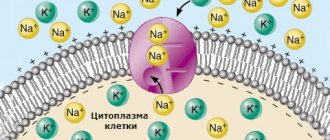Cortisol is a hormone produced by the outer layer of the adrenal glands when exposed to ACTH (corticotropic hormone produced by the pituitary gland). Cortisol is released directly into the blood plasma and, having reached the necessary cells, easily enters the nucleus through the membrane and cytoplasm.
There it stimulates the transcription of certain sections of DNA, which leads to increased glucose synthesis and slower breakdown. In this way, the body’s energy resources are stored and preserved.
What is the hormone cartisol and what is it responsible for?
Cortisol is an endogenous hormone belonging to the group of oxysteroids. It performs vital functions in the body. Formed in the adrenal glands. When producing less or more of the substance, various health problems arise, including irreversible consequences.
Balanced cortisol levels are required for the body to function properly. Therefore, when diagnosing a number of pathologies, tests for this hormone are prescribed.
Cortisol performs the following functions in the body:
- participates in the breakdown of lipids, proteins, carbohydrates;
- helps respond to stress;
- stimulates metabolism;
- regulates blood sugar levels;
- normalizes water-salt balance;
- softens inflammatory processes.
The benefit for a pregnant woman’s body lies in the direct participation of the hormone in the process of fetal development.
According to scientists, mild stressful situations, in which the production of the hormone increases, benefit female beauty. This is achieved thanks to the following effects:
- Normalization of energy metabolism - a surge of strength and energy is felt.
- Reduced permeability of the vascular wall - the vascular network does not appear on the surface of the skin, there are no venous nodules or swellings.
- Suppression of prostaglandin production - increases resistance to infections and viruses, reduces the risk of developing inflammatory processes.
The level of cortisol production is regulated in the pituitary gland, adrenal glands, and hypothalamus. During the day, the amount of the hormone in the body changes. The highest rate is observed in the morning (at approximately 8-00), the lowest at night (at 4-00).
Function of cortisol
Cortisol does:
- increased mobilization of the body under stress factors, exposure to infections, physical overload, and during fasting;
- an increase in blood sugar levels, glycogen and glucose synthesis from protein and fat compounds is triggered;
- the destruction of fat in the leg area is activated, at the same time fat tissue is deposited in the facial and cervical area;
- increased protein breakdown in connective tissue structures and myofibers;
- inhibition of inflammation;
- at the cerebral level, increased excitability and unstable emotional state.
After 24 hours, the blood cortisol level is increased in the morning, and by night it is minimal.
Normal for women
The hormone level varies depending on the age of women. At the same time, experts determined a standard indicator for each group.
Normal indicator for women | |
| Age group | Cortisol level, nm/l |
| From 12 to 15 years | 130-400 |
| From 16 to 38 years old | 130-600 |
| From 40 to 55 years | 110-120 |
| Over 56 years old | less than 120 |
The amount of the hormone can change dramatically under the influence of various factors. And in a woman’s body there is a significant deviation of cortisol from the norm during the period of long-term use of oral contraceptives containing estrogen. A similar reaction occurs due to a surge in hormones.
The age factor has virtually no significant effect on the production of cortisol. But during pregnancy, the rate increases 2-5 times, especially in the third trimester.
The concentration of the hormone and any changes are a source of information in the process of diagnosing pathologies of the adrenal glands and other diseases and hormonal disorders. Taking this into account, the attending physician prescribes tests for cortisol levels in the blood and urine. It is mandatory to reconcile morning and evening indicators.
Hormone levels in the blood
So how much cortisol should be produced?
- The hormone, the norm in women in the morning is from 140 to 620 nmol/l, in the evening should decrease to 48-290 nmol/l.
- In pregnant women, normal levels should be less than 2100 nmol/l and more than 1200 nmol/l.
- In men, the morning cortisol level is 170-535 nmol/l, and in the evening from 65 to 330 nmol/l.
- For children from 12 months to 10 years, the norm is 28-1049 nmol/l cortisol.
- From 10 to 14 years, the amount of the hormone should not exceed 690 nmol/l and less than 55 nmol/l.
- And in the period between 14 and 16 years, the cortisol norm ranges from 28 to 856 nmol/l.
The amount of hormone produced depends on the gender, age of the person, time of day (in the morning its content is higher than in the evening), it is detected not only by blood tests, but also by urine tests.
Lab tests
A referral for a blood (urine) test to determine cortisol levels is prescribed in the presence of the following health problems:
- hypertension;
- suspicion of ACTH (osteoporosis, progressive tumor);
- sudden weight loss/gain;
- physical weakness, fatigue;
- thinning of the skin, formation of stretch marks;
- in the treatment of adrenal glands.
Women should be tested for cortisol if they experience symptoms such as excessive hair growth on the body and face, recurrent thrush, or problems with the menstrual cycle. Children are sent for analysis if they experience premature puberty (regardless of gender).
Cortisol levels are checked in acute depressive states. Usually with this course of the disease it increases greatly.
Other indications for laboratory testing include:
- slow wound healing;
- increased/decreased glucose levels;
- the appearance of swelling and bruising;
- deficiency or excess of potassium in plasma;
- decreased blood pressure, etc.
The hormone is determined by biochemical and general blood tests. Additionally, urine is examined (general analysis), and if necessary, saliva is also taken from the patient.
A trip to the laboratory should be planned in the morning. This is approximately from 7-00 to 10-00. You should refuse to eat before taking blood. One day before donating blood and urine, physical and emotional stress should be avoided. This way you can get a reliable result. When preparing for the procedure, you need to give up alcohol and tobacco. Half an hour before the test, the patient should be in absolute peace.
To obtain adequate information about the level of cortisol and changes in its concentration, repeated samples of biomaterial should be taken. If necessary, additional studies are offered:
- if Cushing's syndrome is suspected, morning and evening tests are taken;
- Dexamethasone stress tests are prescribed (for 1-2 days the patient takes hormonal drugs that reduce the production of cortisol);
- To determine free cortisol, urine collected per day (100-120 ml) is taken.
The hormone level is determined primarily by the CLIA (automated chemiluminescent immunoassay) method. The result is accurate and fast. The research data is known the very next day. The cost of the procedure is 700-900 rubles. With express processing of biomaterial (in 2-3 hours), the price increases to 1200-1400 rubles.
When is it prescribed?
A cortisol test is prescribed by a doctor after examining the patient and taking a medical history. The attending physician decides on the need for diagnostics to check or monitor the functioning of the pituitary gland and adrenal glands. It is the indicators that will give an idea of the health or the presence of pathologies of the endocrine system.
A cortisol test will be ordered if:
- Depression and constant stress. Prolonged blues can provide insight not only into a person’s mental state, but also into their physical health. If the results turn out to be above normal, treatment should be carried out so that the state of depression does not become a permanent process.
- Persistently elevated blood pressure. This option will only be considered if the drugs prescribed to correct blood pressure have stopped working.
- Suspicion of Itsenko-Cushing's disease. This is a condition characterized by increased production of hydrocortisone. The disease is characterized by muscle weakness with constantly elevated blood pressure and excessive body weight.
- Addison's disease or suspected development of such a disease. It is quite rare, and is characterized by a decrease in the level of hormone generation by the adrenal cortex. In this case, the amount of such a substance in the blood will not be increased, but decreased.
You should not interpret cortisone tests yourself.
To correctly interpret the results obtained, you should consult a doctor. A specialist who deals with such problems is called an endocrinologist. Some cases require repeat testing to rule out or confirm the disease.
If the level is increased
Despite the fact that the hormone has a beneficial effect on vital systems and organs, its constant increase puts the woman’s body in a state of chronic stress. This causes the development of various pathologies and complications. For example, the functioning of the thyroid gland is disrupted, and blood pressure increases. The nervous system also reacts negatively to high cortisol levels.
Often, against the background of an excess of stress hormones, women have an increased feeling of hunger. In this case, metabolic processes are disrupted. The body cannot cope with processing large amounts of food, so body weight begins to increase. Obesity develops.
Any deviations of cortisol from normative limits have a detrimental effect on reproductive function. This is fraught with infertility. A persistently elevated level of the hormone is accompanied by the following symptoms:
- absence of menstruation;
- the appearance of acne;
- hair growth on different parts of the body (similar to the male type).
The risks of developing serious complications with elevated cortisol increase many times over.
Forecasted risks:
- insomnia;
- frequent colds;
- heart attack;
- stroke;
- hypofunction of the thyroid gland;
- an increase in blood pressure accompanied by swelling, vomiting, nausea, and chest pain.
During menopause and menopause, the levels of almost all hormones decrease. On the contrary, cortisol increases. Especially against the backdrop of stressful situations. Although ordinary worries about children, husband, and pets are enough to increase the hormone. This manifests itself in the form of insomnia, headaches, mood swings, etc.
Rarely, elevated cortisol indicates pathologies that affect the adrenal glands:
- diabetes;
- benign adrenal tumor;
- oncology;
- AIDS;
- mastopathy;
- protein diets, fasting;
- polycystic ovary syndrome;
- chronic alcoholism.
Long-term use of hormonal drugs can also provoke a persistent increase in cortisol.
Complications with low and high hormone levels
Cortisol is synthesized by the adrenal glands. The hormone is responsible in the human body for converting glucose into energy. If the patient has been in a stressful situation for a long time and was exposed to other provoking factors, then surges in cortisol can provoke the development of complications. High levels lead to hormonal imbalance.
In the absence of adequate treatment, the patient's body becomes vulnerable to the negative effects of external stimuli. The increase in blood pressure becomes chronic. This leads to the development of diseases of the cardiovascular system.
The human body accelerates the process of glucose production, which is accompanied by an increase in blood sugar levels. When there is an excess of cortisol, insulin synthesis is suppressed.
In this case, there is also a high risk of developing osteoporosis: the patient’s body stops absorbing calcium, which leads to bone fragility. With hormone deficiency, a slowdown in the formation of T-lymphocytes is observed: the body’s protective reactions are reduced.
If the level of cortisol in the body is elevated, then potassium and sodium are quickly washed out of the body, which leads to electrolyte imbalance. Patients with a deficiency or excess of the hormone often suffer from obesity. It occurs against the background of disturbances in digestive processes.
Patients may complain of memory impairment. The risk of developing atherosclerosis is quite high. Infertility is possible in both men and women. The body slowly recovers from mechanical injuries. The endocrine system does not work well, the process of hormone production is slowed down.
Deviation from reference indicators can provoke the development of psycho-emotional disorders. The person becomes anxious, depressed, irritated. Outbursts of unmotivated aggression are possible. The patient often has suicidal thoughts.
Cortisol ensures the functioning of most internal systems in the human body. The hormone is responsible for digesting food, supporting the psycho-emotional background and strengthening the immune system. It is necessary to regularly donate blood or urine for analysis in order to promptly identify possible complications if indicators deviate from the norm.
What to do if you have low cortisol
The main provocateurs that reduce cortisol production are disturbances in the functioning of the endocrine system. Other common reasons include:
- Addison's disease;
- hypopituitarism;
- liver cirrhosis, hepatitis;
- congenital insufficiency of the adrenal cortex;
- hypothyroidism
Reduced production of the stress hormone is observed when glucocorticoids are discontinued after a long course of therapy.
A reduced indicator, like an increased one, negatively affects well-being. This manifests itself in characteristic symptoms:
- unreasonable irritability;
- lack of appetite, weight loss;
- nausea, vomiting;
- physical weakness;
- decreased blood pressure;
- fainting;
- the appearance of age spots on the face;
- craving for salty foods;
- muscle pain;
- cardiopalmus.
The female body additionally reacts to a decrease in the stress hormone with hair loss and decreased libido.
Before taking measures to stabilize cortisol levels, it is recommended to undergo tests to clarify the picture. You can use a rapid saliva test. But this analysis produces a less accurate result than a laboratory blood test.
The easiest way to bring the hormone back to normal is to revise your lifestyle. You can introduce morning jogging or perform a set of exercises daily. You also need to exclude fatty foods, smoked foods, alcohol, and coffee from the menu. You should diversify the menu with fresh vegetables, fatty fish, nuts, avocados, coconut or olive oil. It is better to go to bed and get up by adhering to a certain regime. Allow at least 7-8 hours to sleep.
If this method is not successful, doctors prescribe hormone replacement therapy. It is carried out using synthetic corticosteroids. After starting treatment, you need to periodically take tests to monitor the dynamics of hormone growth. Extremely low cortisol levels are increased using special injections.
Lack of cortisol is a secondary factor. First, doctors identify the causes. Only after they are eradicated does the hormone rise to normal levels.
The role of cortisol in the human body
The hormone takes part in metabolic processes occurring inside the body. It is responsible for increasing the rate of absorption of certain minerals and nutrients. Cortisone can be considered a natural energy booster. With its increased concentration, malfunctions in the functioning of internal organs and systems may occur.
Cortisol is considered part of the body's response to a stressful situation.
The hormone is characterized by a number of negative effects. These include the ability of cortisol:
- increase blood pressure;
- slow down the growth of connective tissue, from which muscles are subsequently formed;
- leaching calcium from bones, which leads to their fragility;
- influence blood sugar levels, causing hyperglycemia;
- disrupt the functional activity of the endocrine system;
- influence the functioning of the brain.
Failures in the process of hormone synthesis can lead to a decrease in the body's defenses and obesity. The hormone helps maintain the balance of water and sodium in the body. Its normal concentration helps reduce the rate of fat deposition in the subcutaneous layer. The hormone ensures faster protein dissolution and faster metabolism. Cortisol is also responsible for normalizing blood glucose levels.
Medications
Sometimes it is difficult to bring cortisol levels within normal limits. In this case, an integrated approach is used, including:
- physical activity;
- low carbohydrate diet;
- taking special medications.
Among the drugs used to regulate the hormone, the following pharmacological products stand out.
Metyrapone
The drug is used in the treatment of ectopic ACTH production syndrome, hyperplasia, and adrenal tumors. The active substances reduce cortisol, which allows you to bring the levels back to normal. The product is also used as a diagnostic test. There is experience in combining Metyrapone with surgical or radiation treatment.
When prescribing a medicine, the characteristics of the patient’s body are taken into account. This precaution is due to possible adverse reactions. They manifest themselves in the form of water and salt retention. The risk of developing hirsutism also increases.
Metyrapone is used primarily to determine adrenal function.
Ketoconazole
To normalize cortisol levels, the drug is prescribed in tablet form. Used primarily by athletes to support and build muscle mass. The active substance quickly deals with excess hormone, but this increases the risk of adverse reactions. They make themselves known in the form of nausea, headaches, pain in the abdominal area.
The main purpose of the drug is to fight fungi. Average cost – 195 rubles.
Diet
To regulate cortisol, it is recommended to follow a low-carbohydrate diet. Its essence is identical to the basic rules of healthy eating. There are no strict prohibitions and fasting in it.
The principle of the table is moderate consumption of carbohydrates. They cannot be completely excluded; problems with kidney function, hair, skin and mood may arise. Flour products, fresh baked goods, sugar, and starchy foods are subject to restrictions. The menu less often includes: potatoes, corn, pasta, cereals, bread, soda, etc. When following a diet, you need to consume at least 2 liters of purified water. Nutritionists also advise taking vitamin complexes to balance micro and macroelements.
The frequency of meals is 4-5 times in small portions. Recommended products for a low-carb table:
- grapefruit;
- fresh herbs;
- vegetables fruits;
- lean meats;
- seafood;
- natural yogurt, kefir, yogurt;
- oat bran;
- hard cheeses.
You should exclude fatty, smoked foods, processed foods, and alcohol from your diet. You also need to limit the amount of coffee.
dietary supplements
Dietary supplements will help women bring cortisol levels back to normal. They have minimal contraindications and adverse reactions. The effectiveness of the product is confirmed by test data and experience of use by people of different age groups.
Cortisol Reduction, Relora, Source Naturals, 250 mg, 90 Tablets
The dietary supplement is made on the basis of a patented mixture of plant components, which includes:
- extract from Amur velvet;
- magnolia extract.
The product normalizes cortisol levels and reduces weight gained after a stressful situation. Athletes use the supplement to relieve muscle strain.
The dosage regimen is 1 tablet three times a day, regardless of the time of eating.
Prohibitions on the use of dietary supplements apply to periods of pregnancy and lactation. Combining tablets with alcohol is contraindicated. It is unacceptable to increase the dosage on your own.
The average cost is 2800-3000 rubles.
Nature's Plus Iron Stress Complex, 30 Tablets
The dietary supplement is a vitamin complex that includes: thiamine, riboflavin, niacin, ascorbic acid, biotin, iron and many other components. The product has a beneficial effect on the nervous system and helps cope with stress. Vitamins regulate the functioning of the adrenal glands, which allows cortisol to normalize.
The dietary supplement is taken with food, 1 tablet per day. The product does not have any strict contraindications, but you should consult your doctor before using it.
The average cost is 1500-1600 rubles.
Symptoms of hypercortisolism
A regular increase in cortisol is the cause of the destruction of protein compounds and disturbances in carbohydrate metabolism. The first signal of hypercortisolism is a change in eating behavior. Cravings for certain foods also often appear.
When cortisol levels increase in a woman, there are signs such as:
- Irritability;
- Frequent urge to urinate;
- Menstruation disorders;
- Excessive sweating (hyperhidrosis);
- Dry skin;
- Epidermal rashes and hyperemia of the skin;
- Intestinal dysfunctions;
- Hirsutism;
- Swelling of the face, legs, arms;
- Decreased libido;
- Increased heart rate;
- Excess weight;
- Insomnia, frequent waking up at night or increased sleepiness;
- Stress without an objective reason – emotional instability;
- Low concentration;
- Sedentary feeling of anxiety;
- Metabolic disorders, constant feeling of hunger with the desire to eat sweets or fatty foods;
- Muscle wasting, body weakness;
- Shortness of breath, pain in muscles and joints.
If measures are not taken in a timely manner and hormonal levels are not regulated, hypercortisolism causes the following disorders in the body:
- Suppression of insulin production and excessive secretion of sucrose, which is fraught with the development of diabetes mellitus;
- Deterioration of nutrition and bone tissue resorption – development of osteoporosis;
- Increased cholesterol levels, the appearance of atherosclerotic plaques;
- Decreased calcium absorption;
- Persistent increase in blood pressure and development of diseases of the hematopoietic system;
- Disruptions of the menstrual cycle;
- Deterioration of the thyroid gland;
- Sudden mood swings, suicidal tendencies;
- Slow recovery from injuries;
- Decreased production of happiness hormones - dopamine and serotonin;
- Memory losses;
- Frequent colds due to decreased immunity - the formation and functioning of lymphocytes is disrupted;
- Violation of reproductive ability - infertility.
Folk remedies
Alternative medicine has recipes that help stabilize adrenal function.
Rhodiola rosea
Rhodiola rosea is a natural antidepressant that increases resistance to stress, the adverse effects of microbes and viruses, and climate. When taken as a course, the plant improves mental and physical performance. Herbal products allow the adrenal glands to work in a sparing mode.
The easiest way to use the herb is to prepare tea from the dry preparation. For this, ½ tsp. pour boiling water (250 ml). Let the drink sit for 20-30 minutes under the lid. The dose is divided into 2 doses (morning and evening). You need to drink the product for at least 1 month.
The decoction is prepared according to a similar principle: 10 g of herb is poured into 300 ml of boiling water. Leave for 4 hours. The resulting portion is divided into 2-3 doses during the day. More details...
St. John's wort
All the beneficial properties of St. John's wort have not been fully studied. This invaluable herb helps reduce cortisol levels in just 1-2 weeks. For this, teas, infusions, and decoctions are prepared. The easiest way involves brewing a decoction: for 1 tbsp. l. dry herbs take 300 ml of boiling water. You need to drink the product 2 times. 70-100 ml per day.
Licorice
Licorice also affects the functioning of the adrenal glands. Moreover, scientists express the opinion that the plant is able to regulate cortisol levels, regardless of whether it is increased or decreased. A medicinal herb is recommended for polycystic disease and other disorders of the adrenal glands.
In the morning, it is recommended to drink a glass of tea with licorice root. The duration of the course should not exceed 1-1.5 months. After a 4-6 month break, you can repeat the course of taking the drink.
Prevention measures
It is easier to stabilize cortisol levels with the help of preventive measures. Recommendations include:
- adherence to healthy eating rules;
- normal sleep lasting at least 7 hours (before going to bed, it is recommended to ventilate the room and turn down the heating devices);
- daily exercise;
- yoga, meditation;
- trips to nature (harmony with the outside world helps stabilize the psycho-emotional background);
- abstaining from irritation and stress;
- aromatherapy.
By following simple rules, you can learn to control the stress hormone.











